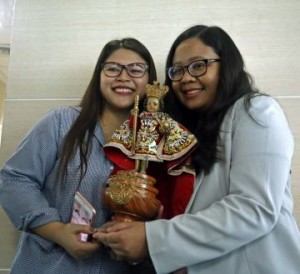
Bar topnotchers Karen Mae Calam Bar passer number 1 (left) and Anne Margaret Momongan number 7 celebrates after hearing they top on the bar exames at their office in SGV accounting firms. The two bar topnotchers studies their law at the University of San Carlos. (CDN PHOTO/LITO TECSON)
Unlike another prominent law school in Cebu, the University of San Carlos (USC) won’t be giving brand new cars to its four new bar topnotchers.
Instead, the school run by missionaries of the Societas Verbi Divini (SVD), commonly known as Society of Divine Word, will grant a lifetime “Gift of Education” scholarship to its topnotchers led by Karen Mae Calam who clinched the top spot in the 2016 Bar examinations.
Lawyer Joan Largo, dean of the USC College of Law, said recipients of the lifetime scholarship grants can nominate a scholar—a relative or not, who in turn may choose any course he or she wishes to enroll in at the university.
When the scholar finishes the program, the bar topnotcher can nominate another scholar.
“They can actually nominate one scholar at a time for the rest of his/her life,” said Largo in an interview on Thursday.
SVD priests, she said, prefer to offer scholarships grants instead of car or any other tangible consideration to highlight the importance of education and teaching people how to catch fish instead of giving them food.
“And with due respect to our students, they really aim to make it to the bar exams for the reason of making it there. I don’t see any other reason behind it,” she explained.
Aside from Calam, USC’s three other bar topnotchers are Fiona Cristy Lao who placed third, Anne Margaret Momongan (7th), and Jefferson Gomez (8th).
All of its 70 bar examinees in 2016 also passed what has been considered the toughest licensure examinations in the country.
Largo said the unique feat has taken place in the same year USC’s College of Law celebrates its 80th founding anniversary.
Since 1937, the school has produced close to 30 bar topnotchers.
Although Calam’s rating of 89.05 percent gave her the top spot in the Bar exams, former Cebu governor and congressman Pablo Garcia’s rating of 91.5 percent in 1951 remains the number to beat in the history of USC.
Largo said a simple salo-salo (meal) to be preceded by a Eucharistic celebration on Friday, May 5, will bring together the four bar topnotchers and all 70 Carolinians who passed the Bar exams.
“Of course, we have to celebrate but any celebration should be grounded on simplicity. We always have our first Friday Mass, but what makes it more special is the fact that it will be offered in thanksgiving for the successful Bar exams,” she said.
As it was in previous years, Largo said USC will always strive hard to inculcate in their students the “culture of excellence.”
“I have seen from my experience in molding our students that the key to passing the Bar exams is to prepare from the first day in the law school. We keep on innovating, and somehow we found the formula of training our students,” she said.
Largo also echoed the plea of law school deans and students in the Visayas and Mindanao region to decentralize the Bar exams.
“That will really improve further the performance of the students and examinees from outside Manila because to take the Bar in Manila is really expensive and it will really have a psychological and emotional impact on you being uprooted from your comfort zone,” she said.
The High Court, she said, has requested law school deans to think of ways on how to make the proposal possible.
“To suggest for the regionalization of the Bar exams is one thing. How to do it is another thing. That is what is on the table,” Largo said.
The proposals include holding the Bar exams in Manila, Cebu, and Davao/Cagayan de Oro.
In an unprecedented turnout, all Bar topnotchers came from provincial law schools, taking the limelight away from Metro Manila-based schools which usually dominate the Bar exams.
A total of 3,747 out of 6,344 examinees passed the Bar exams held at the University of Santo Tomas (UST) in all Sundays of November last year.
The 2016 exams registered a passing rate of 59.06%.